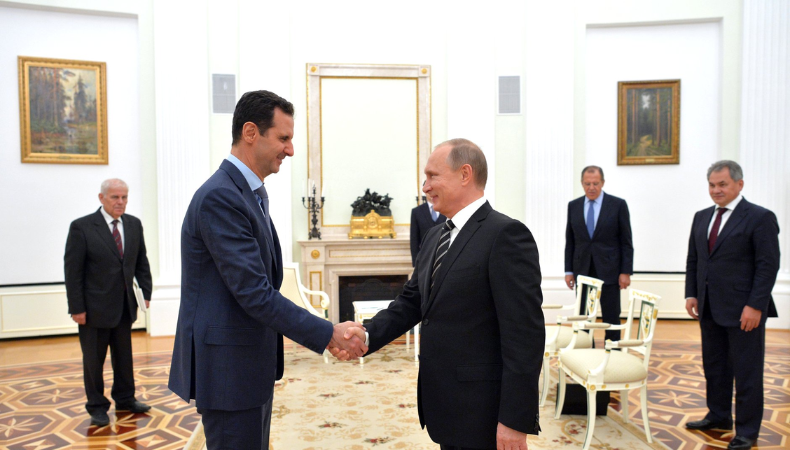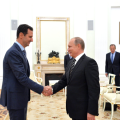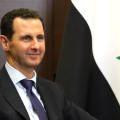Kremlin Showdown: Putin and Assad Meet Amidst Middle East Turmoil

Russian President Vladimir Putin recently brought Syrian President Bashar al-Assad to the Kremlin in a noteworthy diplomatic visit. This crucial conference takes place amid a background of Middle Eastern complicated dynamics and growing tensions. These two leaders’ conversation occurs at a pivotal point with significant consequences for world geopolitics as well as regional stability. Watching intently, the results of their conversation could affect the course of Middle Eastern crises going forward and alter world affairs.
The Players
Vladimir Putin: The Considered Guest
Long central in determining world events is Vladimir Putin, a man renowned for his strategic insight and sharp diplomacy. His rapport with Bashar al-Assad is typical of Russia’s more general strategy for claiming Middle Eastern influence. Putin wants to strengthen Russia’s geopolitical presence in a territory of great strategic relevance by supporting Assad’s government. Russia’s hostility to other powerful regional players, like Turkey, which backs different rebel groups, and Israel, which remains cautious of Assad’s military capacity and the consequences of Russian involvement, makes this alliance not without controversy. Putin’s deliberate support emphasizes his larger strategic objective of increasing Russia’s power across a convoluted web of regional rivalries.
Bashar al-Assad: The Leader Embraced in Embers
Once regarded as a possible reformer, Bashar al-Assad today runs a country devastated by years of terrible strife. The ruthless repression of dissent during his rule set off a civil war that the international community has mostly denounced. Assad’s control of power mostly depends on important relationships, especially with Russia, which has given vital military and political backing. For Assad, who wants to reiterate his stance and obtain sustained support among the current unrest, the meeting with Putin marks a pivotal point. This meeting emphasizes Assad’s unstable situation and his need on outside help to keep his government intact in face of ongoing obstacles.
The Agenda
Geopolitical Adjustment
In the larger geopolitical scene, the meeting between Putin and Assad is a major turnabout. Assad’s government has been much strengthened by Russia’s military engagement in Syria, which has helped him to keep control over vital areas despite the ongoing battle. Still, this backing has strained Russia’s ties to other regional players.
While Iran, another important regional state, has its own geopolitical interests in Syria, Turkey, a major stakeholder in the Syrian crisis, has regularly opposed Assad and backed different rebel groups. Israel keeps a careful eye on things since it worries about the possible dangers presented by Assad’s government and the deployment of Iranian troops in Syria. The talks between Putin and Assad could have far-reaching effects on these relationships, therefore impacting regional dynamics and determining future diplomatic contacts.
Humanitarian Crisis
Millions of people displaced and severely lacking in basic resources such food, water, and medical treatment, the continuous violence in Syria has set off a terrible humanitarian disaster. The humanitarian toll of the conflict still worries the world community greatly, hence Russia’s relentless support of Assad begs doubts on its dedication to solve these urgent problems. Notwithstanding diplomatic initiatives, the suffering of common Syrians persists and the humanitarian crisis is still a major obstacle. Beyond Syria, this crisis shapes world impressions and asks for more efficient worldwide action and assistance.
Regional security
With continuous strife in Yemen, Iraq, and Libya adding to regional instability, the Middle East is still among the most unstable area of the world. In this framework, the conversations between Putin and Assad most certainly covered a spectrum of security-related subjects, including the careful balance of power in the area and counterterrorism plans. The results of their negotiations might affect not only Syria but also surrounding nations and dynamics of world security. The possibility of more cooperation or escalation in regional security projects emphasizes the need of this diplomatic involvement and its possible influence on more general world stability.
Keep On Reading
Conclusion
The world saw the ramifications of Vladimir Putin and Bashar al-Assad’s conversations as they came to an end behind closed doors of the Kremlin. The results of their interaction will determine the course of a country devastated by war and affect the complex Middle East balance of power.
The great stakes involved highlight the important character of this diplomatic interaction with possible consequences beyond of Moscow. The world community will closely track how this conference affects regional stability, humanitarian initiatives, and world geopolitics as the events develop. In one of the most difficult conflict areas in the world, the communication between these two leaders marks a turning point in the continuous search for stability and peace.







